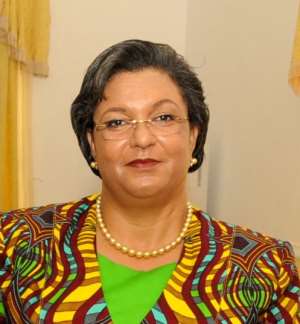
Ghana has affirmed her commitment at the on-going United Nations General Assembly Special Session on World Drug Problem (UNGASS 2016) to ensure that people who are dependent on drugs are subjected to the Public Health System and not to the Criminal Justice System.
This follows the realization that "they need public health and not criminal measures".
Stating Ghana's position at the on-going UNGASS 2016 at the United Nations Headquarters in New York on Wednesday, (April 20, 2016) Foreign Affairs and Regional Integration Minister Hanna Serwaah Tetteh said "it is important to integrate Public Health and Human Rights approaches to drug control. We have to ensure an increase in resource allocation for Health and Human Rights based policies in drug control".
In this vein, the Minister who led a high-powered government delegation to UNGASS said Ghana advocates the development of a systems-wide policy on protection of Human Rights in drug -related programming by the UN System Task Force on Transnational Organized Crime and Drug Trafficking.
"We believe that this will naturally lead to the building upon and operationalisation of existing UN Human Rights Due Diligence and Policy", the Minister stated.
Touching on the need for the 30th special session to build on current discussions on drug control indicators under the Sustainable Development Goals and the Inter-Agency and Expert Group on SDGS indicators, Ms Tetteh urged the UN Statistical Commission to develop new pro-development metrics to help prepare the next Political Declaration.
In addition, the Minister called for the creation of a forum to encourage Member States, international organizations, academia and civil society to share robust scientific evidence about the wide range of drug control criminal justice response policy interventions and their outcomes.
This should inform the basis of any new political declaration and plan of action in 2019, she pointed out.
"We also call for the establishment of a high level independent expert commission supported by the World Health Organization to analyze the state of global access to controlled medicines and advise on measures to improve it", Ms Tetteh stated. Another suggestion from Ghana for the consideration of Member States was the development of a coherent UN-system-wide guidance on the programming of treatment of drug use disorders for applications across UN programming context.
Furthermore the country hoped that the outcomes of the review process will ensure that in "rebalancing international policy on drugs, greater policy is placed on health and human rights including treatment, care, harm and risk reduction".
In the determination to widen the space to re-think global drug control strategies, Ghana hoped that the flexibility in implementation of any international drug policy should not be treated as an encrypted synonym for unprincipled laissez-faire, insisting that "flexibility must be seen as a core part of a process of collective drug policy development within the United Nations. Flexibility must be based on principled pluralism".
 some members of Ghana's delegation at UNGASS
some members of Ghana's delegation at UNGASS




 Former Kotoko Player George Asare elected SRC President at PUG Law Faculty
Former Kotoko Player George Asare elected SRC President at PUG Law Faculty
 2024 elections: Consider ‘dumsor’ when casting your votes; NPP deserves less — P...
2024 elections: Consider ‘dumsor’ when casting your votes; NPP deserves less — P...
 You have no grounds to call Mahama incompetent; you’ve failed — Prof. Marfo blas...
You have no grounds to call Mahama incompetent; you’ve failed — Prof. Marfo blas...
 2024 elections: NPP creates better policies for people like us; we’ll vote for B...
2024 elections: NPP creates better policies for people like us; we’ll vote for B...
 Don’t exchange your life for wealth; a sparkle of fire can be your end — Gender ...
Don’t exchange your life for wealth; a sparkle of fire can be your end — Gender ...
 Ghana’s newly installed Poland train reportedly involved in accident while on a ...
Ghana’s newly installed Poland train reportedly involved in accident while on a ...
 Chieftaincy disputes: Government imposes 4pm to 7am curfew on Sampa township
Chieftaincy disputes: Government imposes 4pm to 7am curfew on Sampa township
 Franklin Cudjoe fumes at unaccountable wasteful executive living large at the ex...
Franklin Cudjoe fumes at unaccountable wasteful executive living large at the ex...
 I'll 'stoop too low' for votes; I'm never moved by your propaganda — Oquaye Jnr ...
I'll 'stoop too low' for votes; I'm never moved by your propaganda — Oquaye Jnr ...
 Kumasi Thermal Plant commissioning: I pray God opens the eyes of leaders who don...
Kumasi Thermal Plant commissioning: I pray God opens the eyes of leaders who don...
